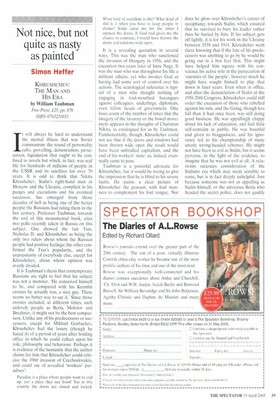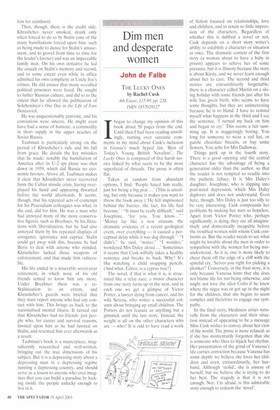Not nice, but not quite as nasty as painted
Simon Hoffer
KHRUSHCHEV: THE MAN AND HIS ERA by William Taubman Free Press, £25, pp. 876 ISBN 0743231651 1 t will always be hard to understand the mental illness that was Soviet communism: the round of personality cults, grovelling, denunciation, persecution, liquidation that ought to be confined to novels but which, in fact, was real life for hundreds of millions of people in the USSR and its satellites for over 70 years. It is odd to think that Nikita Khrushchev, Stalin's right-hand man in Moscow and the Ukraine, complicit in his purges and executions and his eventual successor, has emerged from those decades of hell as being one of the better people the Russians had ruling them in the last century. Professor Taubman, towards the end of this monumental book, cites two polls recently taken in Russia on this subject. One showed the last Tsar, Nicholas II. and Khrushchev as being the only two rulers about whom the Russian people had positive feelings; the other confirmed the Tsar's popularity, and the unpopularity of everybody else, except for Khrushchev, about whom opinion was evenly divided.
It is Taubman's thesis that contemporary Russians are right to feel that his subject was not a monster. 'He conceived himself to be, and compared with his Kremlin cronies he actually was, a nice guy. There seems no better way to say it.' Since those cronies included, at different times, such unlovely people as Beria, Molotov and Brezhnev, it might not be the best comparison, Unlike any of his predecessors or successors, except for Mikhail Gorbachev, Khrushchev had the luxury (though he hated it) of a period of years after holding office in which he could reflect upon his role, philosophy and behaviour. Perhaps it is evidence of the humanity that the author claims for him that Khrushchev could criticise the 1968 invasion of Czechoslovakia, and could say of so-called 'workers' paradises':
Paradise is a place where people want to end up, not a place they run from! Yet in this country the doors are closed and locked. What kind of socialism is this? What kind of shit is it when you have to keep people in chains? Some curse me for the times I opened the doors. If God had given me the chance to continue. I would have thrown the doors and windows wide open.
It is a revealing quotation in several ways, This was the man who sanctioned the invasion of Hungary in 1956, and the execution two years later of Imre Nagy. It was the man who was throughout his life a militant atheist, yet who invokes God as having had some sort of control over his actions. The scatological reference is Typical of a man who thought nothing of engaging in foul-mouthed harangues against colleagues, underlings, diplomats, even fellow heads of government. One loses count of the number of times that the imagery of the lavatory or the bowel movement appears in the thoughts of Chairman Nikita, as catalogued for us by Taubman. Fundamentally, though, Khrushchev could not see that if the doors and windows had been thrown wide open the result would have been unbridled capitalism, and the end of his workers' state: as, indeed, eventually came to pass.
Taubman is a powerful advocate for Khrushchev, but it would be wrong to give the impression that he is blind to his severe faults. He paints a clear picture of Khrushchev the peasant, with foul manners to complement his foul tongue. Nor
does he gloss over Khrushchev's career of sycophancy towards Stalin, which ensured that he survived to bury his leader rather than be buried by him. If his subject gets off lightly, it is for his work in the Ukraine between 1938 and 1941. Khrushchev went there knowing that if the fate of his predecessors was anything to go by he would be going out in a box feet first. This might have helped him square with his conscience his active role in the persecution of 'enemies of the people', however much he might have sought himself to play that down in later years. Even when in office, and after the denunciation of Stalin at the 1956 20th Congress, Khrushchev could still order the execution of those who rebelled against his rule, and the Gulag, though less full than it had once been, was still doing good business. He was appallingly chippy about his lack of education, and had little self-restraint in public. He was boastful and given to braggadocio, and his ignorance led to his championship of many utterly wrong-headed schemes. He might not have been so evil as Stalin, but it seems perverse, in the light of the evidence, to imagine that he was not evil at all. A relativism saturates consideration of the Stalinist era which may seem sensible to some, but is in fact deeply unhelpful. Just because someone was not as appalling as Stalin himself, or the atrocious Beria who headed the secret police, does not qualify
him for sainthood.
Then, though, there is the credit side. Khrushchev never smoked, drank only when forced to do so by Stalin (one of the many humiliations forced upon him, such as being made to dance for Stalin's amusement, and to grovel from time to time for the leader's favour) and was an impeccable family man. On his own initiative he led the assault on Stalin's memory and record, and to some extent even while in office admitted his own complicity in Uncle Joe's crimes. He did ensure that many so-called political prisoners were freed. He sought to futher Russian culture, and did so to the extent that he allowed the publication of Solzhenitsyn's One Day in the Life of Ivan Denisovich.
He was unquestionably patriotic, and his convictions were sincere. He might even have had a sense of humour, a commodity in short supply in the upper reaches of Soviet Russia.
Taubman is particularly strong on the period of Khrushchev's rule and his fall from grace. He details the key mistakes that he made: notably the humiliation of America after its U-2 spy plane was shot down in 1959, which did Russia no economic favours. Above all, Taubman makes it clear that Khrushchev never recovered from the Cuban missile crisis, having overplayed his hand and appearing thwarted before the world afterwards. It seems, though, that his repeated acts of contempt for his Praesidium colleagues was what, in the end, did for him. He was a man who had annoyed many of the more conservative figures, such as Brezhnev, by his flirtations with liberalisation. but he had also annoyed them by his repeated displays of arrogance, ignorance and caprice. Stalin could get away with this, because he had Beria to deal with anyone who minded. Khrushchev lacked those weapons of enforcement, and that made him vulnerable.
His life ended in a miserable seven-year retirement, in which none of his old friends semed to know him any more. Under Brezhnev there was a re Stalinisation to an extent, and Khrushchev's guards were briefed that they must report anyone who had any contact with him. This brings us back to the nationalised mental illness. It turned out that Khrushchev had no friends: just people who, for career and survival reasons, fawned upon him as he had fawned on Stalin, and resented him ever afterwards as a result.
Taubman's book is a masterpiece, magnificently researched and well-written, bringing out the true dimensions of his subject. But it is a depressing story about a depressing man in a depressing regime running a depressing country, and should serve as a lesson to anyone who ever imagines that you can build a paradise by locking inside the people unlucky enough to live in it.



































































 Previous page
Previous page